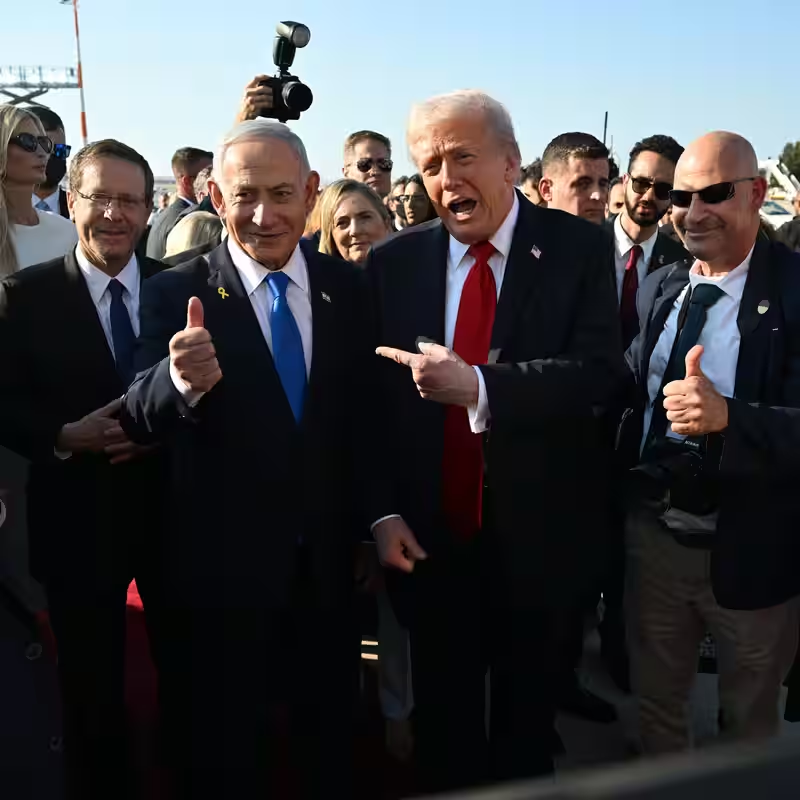Table of Contents
- Trump’s Bold Pardon Plea for Netanyahu
- Netanyahu’s Ongoing Corruption Trial
- Can the Israeli President Actually Pardon Netanyahu?
- Legal and Political Hurdles to a Pardon
- Public Opinion Deeply Divided
- Sources
Trump’s Bold Pardon Plea for Netanyahu
In a surprising intervention into Israeli domestic affairs, former U.S. President Donald Trump has publicly called on Israel’s president, Isaac Herzog, to pardon Prime Minister Benjamin Netanyahu. The request came during Trump’s whirlwind Middle East tour, where he was already basking in praise for brokering the recent Gaza ceasefire.
“Bibi has done more for Israel than any leader in history,” Trump told reporters in Jerusalem. “He’s under attack by corrupt elites and biased courts. It’s time for President Herzog to step in and grant him a full and immediate pardon.”
The statement stunned legal experts and political analysts alike—not only because foreign leaders rarely weigh in on another country’s judicial matters, but because the Israeli presidency has extremely limited power when it comes to pardons in ongoing criminal cases.
Netanyahu’s Ongoing Corruption Trial
Benjamin Netanyahu has been embroiled in a high-profile corruption trial since 2020, facing charges of bribery, fraud, and breach of trust across three interconnected cases—commonly referred to as Cases 1000, 2000, and 4000.
- Case 1000: Alleges Netanyahu received luxury gifts (champagne, cigars, jewelry) from wealthy benefactors in exchange for political favors.
- Case 2000: Involves a proposed quid pro quo with a newspaper publisher to secure favorable coverage.
- Case 4000: The most serious, accusing Netanyahu of granting regulatory favors to a telecom giant in return for positive media coverage.
Netanyahu has denied all wrongdoing, calling the investigations a “witch hunt” orchestrated by left-wing opponents and a hostile media. His trial continues even as he serves as prime minister—a first in Israel’s history.
Can the Israeli President Actually Pardon Netanyahu?
Here’s where Trump’s call runs into legal reality: under Israeli law, the president can issue pardons—but only after a conviction, not during an ongoing trial.
Article 11(b) of Israel’s Basic Law: The President of the State grants the power to pardon or commute sentences “on the advice of the Minister of Justice.” Crucially, this authority does not extend to preemptive pardons. Unlike the U.S. president, who can pardon federal offenses at any time—even before charges are filed—Israel’s system is far more constrained.
“Trump may be thinking of his own pardon powers,” said Dr. Michal Tamir, a constitutional law professor at Ono Academic College. “But in Israel, a pardon before conviction is legally impossible. It would be seen as political interference in the judiciary.”
Legal and Political Hurdles to a Pardon
Even if Netanyahu were convicted, a pardon would face steep obstacles:
- Minister of Justice Approval: The justice minister—currently a member of Netanyahu’s coalition but historically independent—must recommend the pardon.
- Public Backlash: A pardon could ignite mass protests, echoing the 2023–2024 judicial reform demonstrations.
- Presidential Reluctance: President Herzog, a former opposition leader, has emphasized judicial independence and is unlikely to intervene.
Moreover, legal scholars note that pardoning a sitting prime minister could set a dangerous precedent, effectively placing the leader above the law.
Public Opinion Deeply Divided
Netanyahu remains a polarizing figure. His supporters hail him as a security-minded statesman who normalized ties with Arab nations and stood firm against Iran. Critics accuse him of eroding democratic norms and prioritizing personal survival over national interest.
A recent Channel 12 poll showed 48% of Israelis oppose any form of legal leniency for Netanyahu, while 42% support it—largely along political lines.
For now, Trump’s call appears more symbolic than practical—a show of loyalty from one controversial leader to another. But in Israel’s fragile political climate, even symbolic gestures can ripple into real consequences.
Sources
The New York Times: Trump Calls for Israel’s President to Pardon Netanyahu. Could it Happen?




